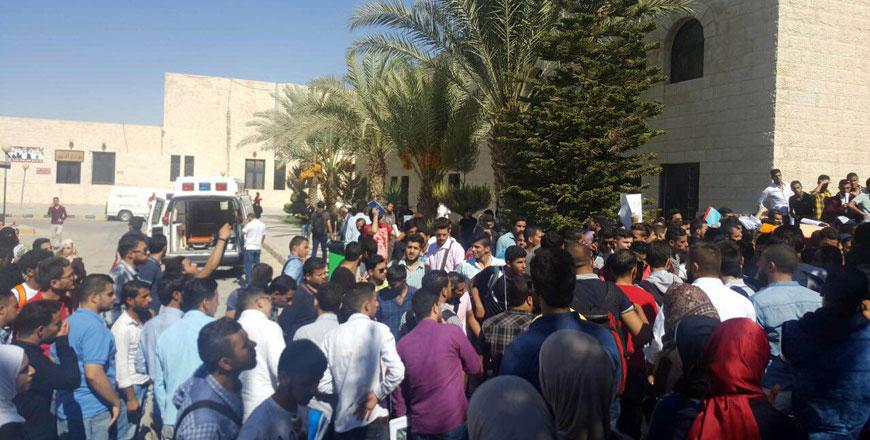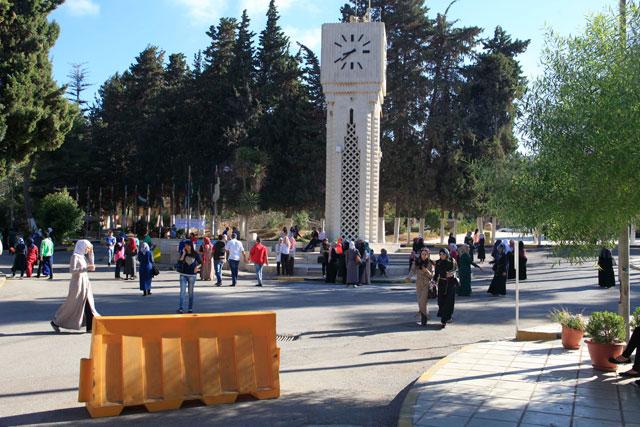You are here
Fear blamed for UJ students’ low participation in politics
By Suzanna Goussous - Feb 08,2016 - Last updated at Feb 11,2016
AMMAN — Students and experts attributed the low participation of the University of Jordan’s (UJ) students in politics to “fear of negative consequences” and doubt that they can make a difference.
Only about half of students at the Kingdom’s largest university were interested in politics, according to survey findings shared with the media last week by UJ’s Centre of Strategic Studies (CSS). In addition, 66 per cent of UJ students reported having no affiliation with any political or intellectual movement according to CSS, which carried out the study in December.
Commenting on the findings of the survey, released last week, student activists shed doubt on the results, citing the fact that respondents were not ensured anonymity.
Mohammad Dmour, a member of the UJ student union, said the figures in the study regarding political interests are “not accurate”, since students were required to write their university numbers along with their responses.
“Students had to write down their university numbers… This shows that the survey was monitored and the information provided by students might have negative consequences,” he told The Jordan Times.
He noted that many students “did not express their opinions correctly” and preferred to “remain neutral” to stay on the safe side, noting that the curricula also play an important role in the absence of political awareness on campus.
“The curricula do not encourage students to think outside the box or support intellectual movements. Lack of political knowledge is a serious issue, especially since those who took the survey are of young ages," Dmour said.
“Different opinions build a successful country,” he added.
University student and activist Alaa Hijjeh said some professors told students that writing their university number was obligatory, which made students feel “monitored”.
“University regulations criminalise the participation of students in politics; it is listed with campus violence,” he told The Jordan Times.
He said students were asked many times to cancel events that were not related directly to the curricula, stressing the difficulty of arranging political events.
According to Hijjeh, the low interest in political participation in the Kingdom reflects the imposition of a “martial law” in previous years and a mindset that sees involvement in politics as a sin.
“The low number of students affiliated with political movements shows that there is a policy of intimidating students,” he said. “Banning political activity on campus gives way to passing other regulations that students do not approve of.”
Dina Hallak, a fourth-year university student, said she does not participate in political movements because “they are not going anywhere”, adding that students sometimes feel “restricted” when it comes to freedom of choice.
“I do not like participating in political events as I believe it wouldn’t make a difference and it’s all about wasta [favouritism],” Hallak told The Jordan Times.
Emily Naffa of the Jordanian Communist Party said the low rate of political participation is due to the limitations on individuals in the country and the penalties against those who support or belong to an intellectual or political movement.
“The low political turnout has been going on for a long time. Limitations are set against those who can actually make a difference in our society,” she told The Jordan Times.
The activist said this is a result of “repression” of the public and the negative consequences of expressing their opinions or supporting certain movements.
“Individuals should demand more freedom politically and intellectually. We have to demand freedom for all citizens, starting with students and parties,” she added.
UJ CSS Director Musa Shteiwi said students and the younger generation in general should show some interest in politics, but it is not the responsibility of faculty members to encourage them to join political parties.
“Universities are not primarily responsible for engaging students in political movements. They are educational institutions. We can’t ask universities to promote political participation. However, campuses should have more intellectual and religious freedoms,” he told The Jordan Times.
Shteiwi added that society and political parties should take some of the responsibility for the absence of the younger generation in politics.
“The [inadequate] tools for linking young citizens to political parties explain the absence of participation in politics,” he said, adding: “Universities should encourage intellectualism and freedom of expression and promote more voluntary work among students in cooperation with civil society organisations.”
For his part, Minister of Political and Parliamentary Affairs Khaled Kalaldeh said the actual rate of participation in political movements in the country is “much lower” than that recorded in the study.
“Young Jordanians are reluctant to participate in political movements due to several obstacles and the educational system in universities. The fact that only 33 per cent of students believe the parties represent them should be dealt with,” he told The Jordan Times.
He noted that the ministry is working on a plan to encourage the younger generation to participate in politics.
Several amendments were made to the Political Parties Law in the Kingdom to promote political movements, he said, including lowering the minimum required age of a party co-founder to 18 from 21.
Referring to article 19 of the Political Parties Law, Kalaldeh said citizens should not be questioned or treated differently because they belong to a specific political movement and stressed the importance of the participation of younger citizens in politics.
“Those who started the revolutions in the Arab world were of young ages, with a large percentage of women, seeking a better way of life and a brighter future. I encourage motivating our students instead of setting fines or penalties,” he added.
Related Articles
AMMAN — Student activism “witnessed an improvement” in 2016, with many demonstrations taking place on campuses, but politicians and activist
AMMAN — As the Ministry of Higher Education examines a plan to give security personnel at universities law enforcement status, university st
AMMAN — Sixty-seven per cent of Jordanians oppose the involvement of university students in political parties, according to a recent survey

















